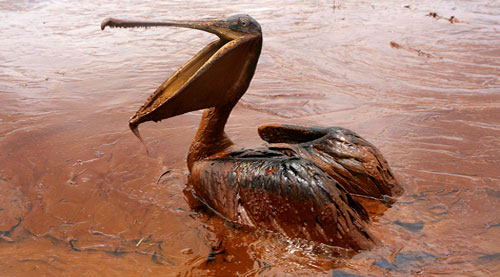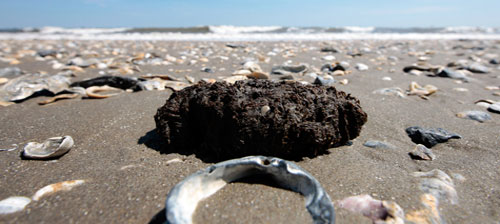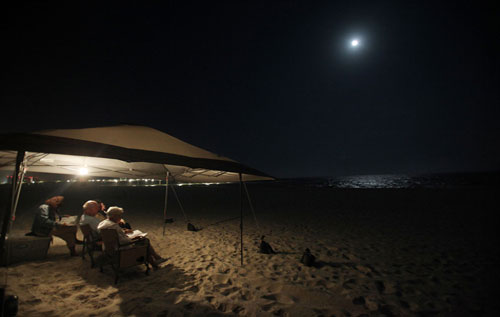Gulf of Mexico: One year after the oil spill disaster
It has been a year since the explosion of the Deepwater Horizon rig, causing hundreds of millions of liters of oil to flow into the sea, but the consequences it has left today are still very heavy.
A year ago, on April 20, 2010, the Deepwater Horizon, 50 miles away from the Louisiana coast, suddenly exploded and sank into the sea, killing 11 workers and causing hundreds of millions of liters of crude oil. Spill into the sea, becoming the biggest oil spill ever.

The oil spill on the Gulf of Mexico has caused heavy ecological disasters.
Within 86 days of the explosion, the Deepwater Horizon rig has nearly 200 million gallons of crude oil, tens of millions of gallons of natural gas and 1.8 million gallons of unidentified chemicals have swept into the sea. north of the Gulf of Mexico, causing a serious ecological disaster for the area of more than 1,500 km2, affecting the business of a range of marine industries.
BP , which hired the rig, took more than three months to cover the leak from the well, costing up to $ 4 billion.
After nearly a year of troubleshooting, BP affirmed: 'The impacts have been minimized, the marine environment has been improved by some areas, some beaches have been allowed to operate. Again . ' However, many scientists argue that the truth is not so. Because these catastrophes caused by the largest oil spill in history still remain an unknown threat that can never be overcome.
Below is a set of photos showing the current state of the Gulf of Mexico, a year after the oil spill disaster . Photos are posted on Boston.com.

A tar pitch drifted to the coast at Port Fourchon, Louisiana on April 13. Tars and oil slicks are still very much on the Louisiana coast a year after the Deepwater Horizon explosion on April 20, 2010.

Everyone prayed together in an early morning to commemorate the 1 year of the oil spill in the Gulf of Mexico at Orange Beach, Alabama on April 20, 2011.

Veterinarian Wendy Hatchett at the Mammal Marine Research Institute prepares to sample the skin of a dead bottlenose dolphin found on the island of Ono, Alabama and then brought to the lab in Gulfport, Mississippi . According to the US National Oceanic and Atmospheric Administration (NOOA), since January 2011, there have been 155 baby bottlenose dolphins or both pregnant and small whales. and waves washed ashore - 4 times higher than normal. And an official of NOOA said that spilling oil could be a cause of these deaths.

The corpse of an endangered sea turtle enters the coast at Pass Christian, Mississippi on April 16, 2011. According to the US National Wildlife Conservation Agency, the corpses of sea turtles drifting to the coast in the Gulf of Mexico are three times higher than normal in March.

Melvin Barnes, restaurant owner and Cruz seafood market in St. Bay Louis, Mississippi sat in his deserted restaurant on March 29, 2011. Water contaminated with oil has reduced the amount of seafood caught, customers away from restaurants and refused to eat seafood from the Gulf of Mexico. Barnes had to sell the truck to get cash and was waiting for compensation.

Brad Mizell pointed to sores on his arms before attending a meeting for people in the Gulf of Mexico affected by oil spill health on April 18, 201. Mizell worked on BP's cleanup program, which hired local fishermen to clean up the spill.

A fishing boat is anchored on the sea in Grand Isle before sunrise. The fishing and tourism industry of Grand Isle has been severely affected by the oil spill.

The Louisiana state security helicopters flew across the swamp on the way to Middle Ground, South Louisiana on April 19. One year after the oil spill in the Gulf of Mexico, BP announced that most of the oil had been recovered, but the fishing industry and Louisiana's wild life said that the amount of oil recovered It is located only on the surface, while oil has penetrated into the soil, killing plants and in the long run will affect the ecosystem of this delta.

The swimmers walk along the shore, while the cleaning workers are still collecting tar. A year after the disaster, large and small tarp floats still drift into the coast in the Gulf of Mexico.

A worker protecting wilderness in Louisiana with oil-covered hands on April 19, 2011 in Middle Ground, Louisiana.

Workers are cleaning up in the heavily impacted coastline area of the Mississippi River where it flows into the Gulf of Mexico.

A woman walks on the coast when waves from the Gulf of Mexico rush to shore on Grand Isle on April 13, 2011. Residents said the oil still floated ashore after the storms.

A stork stood on a beach chair on Orange, Louisiana beach exactly one year after the disaster on April 20, 2011.
- More than 9 million liters of oil spill into the Gulf of Mexico every day
- The century oil spill still has consequences
- Oil again sprayed under the Gulf of Mexico
- The fish is genetically modified for the Gulf of Mexico oil spill
- The US oil spill plan failed
- Animals met with oil spills
- The silent savior of the Gulf of Mexico
- Gulf of Mexico 'diving'
- Oil spill in America
- Block oil spill in America with mud
- Most of the oil is still
- 'Dead zone' in the Gulf of Mexico expands record
 Is the magnetic North Pole shift dangerous to humanity?
Is the magnetic North Pole shift dangerous to humanity? Washington legalizes the recycling of human bodies into fertilizer
Washington legalizes the recycling of human bodies into fertilizer Lightning stone - the mysterious guest
Lightning stone - the mysterious guest Stunned by the mysterious sunset, strange appearance
Stunned by the mysterious sunset, strange appearance